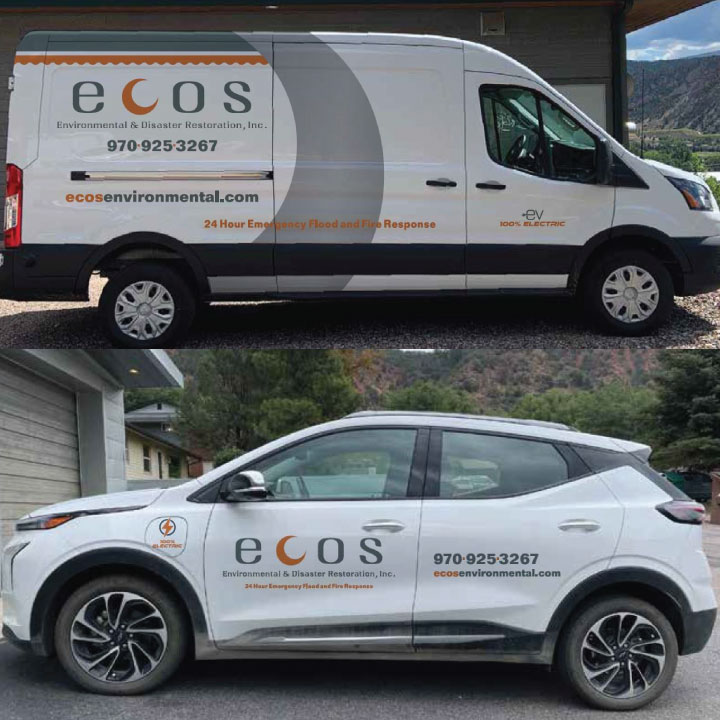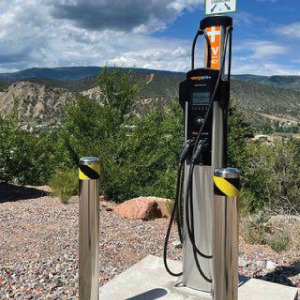

James and Theresa Lowry, owners of ECOS Environmental & Disaster Restoration in Glenwood Springs, are electrifying their fleet of vehicles.
ECOS was founded in 2004 and specializes in 24/7 emergency response, offering a full range of environmental, catastrophe, and residential services. ECOS also provides disaster cleanup, performing flood, fire, and hazardous material services.
After purchasing ECOS in 2013, James and Theresa turned their attention to building a great employee base and finding ways to save the company money.
As many small businesses look to electrify their fleet vehicles, the Lowrys initially assumed the investment in an electric fleet might be outside of their budget.
After working with local energy efficiency partners at CLEER, ECOS was able to help offset the cost of equipment by being awarded a grant for Electric Vehicle Supply Equipment (EVSE) from the Colorado Energy Office. The funding helped offset the cost of installing three dual-port ChargePoint charging stations.
The savings from the grant and the long-term savings associated with electric vehicles vs. gas-powered vehicles made the decision easy for the Lowrys.
Due to the anticipated savings this year, ECOS purchased and reserved three Ford eTransit Cargo Vans, two Chevy Bolts, and one Class 4 Electric Box Truck.
All the vehicles will be charged using solar energy from the 24.3 kW solar panel system ECOS installed earlier this year at their facility.
In addition, ECOS has ordered three Ford Lightning F150s and anticipates delivery in the near future.
We asked James and Theresa a few questions about why they decided to pursue smart electrification:
What made you decide on fleet electrification of your vehicles?
We experienced a dramatic increase in maintenance costs during the last three years and many of our gas and diesel vehicles needed repairs too frequently. We jokingly said that our fleet was half on the road and half at the local mechanic getting fixed. We found it very difficult to purchase new gas and diesel vehicles to replace aging vehicles in our fleet. Also, the company’s profitability fluctuated with the gas and diesel fuel prices at the pump; in fact, our monthly fuel costs doubled from 2020 to 2022. These important factors made us research buying electric vehicles as more and more car manufacturers committed resources to produce EVs. The biggest obstacle to buying electric vehicles was where you charge them and how many miles a 100% charge allows the vehicle to travel. To address the charging dilemma, we decided to invest in charging stations at our offices and seek grant money from the State of Colorado. Fortunately, we were awarded $27,000 in grants for three dual-port EV charging stations for our Glenwood Springs office. Mike Steiner at Holy Cross Energy (HCE) was a huge reason why we received this important grant funding, and our company will greatly appreciate HCE’s support throughout the process. Another important initiative to electrifying our fleet was solar energy. We decided to invest in solar energy to charge our electric vehicles with solar panels subsidized with federal tax incentives.
Were there any challenges to overcome when making the decision?
The biggest challenge is addressing “range anxiety” through additional charging stations along Hwy 82 and I-70. We are facing some logistical challenges with the larger electric vehicles that have a maximum range of 130 miles. Also, we will see how the range of the larger electric vehicles is affected by the Colorado winter. On a positive note, the range of electric vehicles has increased as our drivers get better at managing their driving behavior to optimize the electric battery charge. We are in the process of installing charging stations at our office in Parachute. Our old town Parachute office is located right off the highway by a very short distance and roughly halfway between Glenwood Springs and Grand Junction. Therefore, it’s an ideal location that will be a key one to charge our EV fleet, which travels up and down the I70 highway between these two cities.
What would you say to other small business owners considering making the jump to EVs?
Holy Cross Energy (HCE) is an excellent resource, so I would recommend contacting them about installing EV charging stations and answering any questions you might have. Further, they have a geographical map of EV charging station locations which updates regularly as more and more EV charging stations get installed. After developing an EV charging plan that could include a home EV charger, I think the smaller electric vehicles (EVs) are a great resource for inspections, customer visits, traveling to and from work, etc. Our first electric vehicle was a smaller EV that now regularly travels nearly 225 miles on a full charge. These smaller EVs have been easy to incorporate into our fleet, and they are given to supervisors who do a great job of managing their driving behavior to optimize the electric battery charge.

No Comments
Sorry, the comment form is closed at this time.